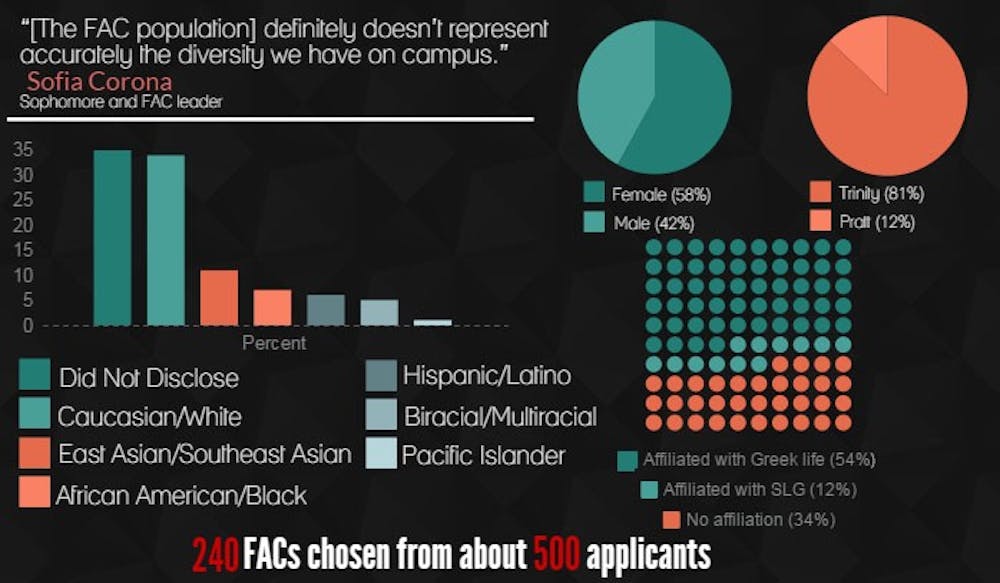Although Duke’s First-Year Advisory Counselor Program has focused on improving its diversity and has added new training sessions, it remains disproportionately Greek-affiliated.
FACs are often the first upperclassmen freshmen interact with when they arrive at Duke, as they assist with the move-in process and lead small group discussions during Orientation Week, but diversity has not always been emphasized in the FAC selection process. According to statistics from FAC Board co-chairs Sherry Zhang and Leah Mackay, both seniors, 34 percent of this year’s FACs identified as Caucasian or white, 11 percent as East Asian or Southeast Asian, 7 percent as African American or black, 6 percent as Hispanic/Latino(a), 5 percent as biracial or multiracial and 1 percent as Pacific Islander. Of the 240 FACs, 35 percent did not disclose their race or “preferred not to share.”
In addition, 58 percent identified as female and 42 percent as male, and 81 percent were in Trinity compared to 19 percent in Pratt.
“The diversity of our group is highly dictated by the students that apply,” Zhang and Mackay wrote in an email. “We definitely believe that racial and affiliation diversity is important, and therefore we do our best to make the FACs represent Duke as best as possible.”
The program has come under criticism in previous years for having disproportionately high numbers of Greek-affiliated participants. Of this year’s FACs, 54 percent were affiliated with a fraternity or sorority, and 12 percent were affiliated with a selective living group. Only 34 percent of Duke students overall are affiliated with a Greek organization, according to the Office of Fraternity and Sorority Life.
Max Schreiber, senior and president of Interfraternity Council, noted that many Greek-affiliated students are encouraged to participate in the program as a “great opportunity to practice empathy and communication.”
“Campus leadership is something that’s encouraged and expected across all Greek chapters at Duke, and FAC is just one of many ways Greeks get involved,” Schreiber said. “For my chapter [Alpha Epsilon Pi] specifically, the FAC program is one of the first we mention to new members asking for leadership opportunities.”
Sophomore Sofia Corona, who was a FAC this year, said the large percentage of Greek FACs was made evident during a group activity when participants were asked to stand up if they were affiliated. A majority stood up, she noted.
“It definitely doesn’t represent accurately the diversity we have on campus,” Corona said. “It might expose first-years to the idea that all of Duke’s campus is like the FAC program—since they are the first people they interact with on campus—instead of how it actually is.”
Corona also said she thinks the program attracts a certain personality type, particularly people who are more outgoing and involved than the average Duke student.
She added, however, that she believes the program is doing its best to foster diversity.
“The selection process is fair. They try to create the most diversity that they can,” she said. “I think they are limited by the people who apply.”
As part of the selection process, students first submit an application, which includes questions on race, sex and citizenship, that is read by two FAC board members. Selected applicants then participate in two 10-minute interviews with two different FAC board members. The process reduces the approximately 500 initial applications to the final pool of 240 FACs.
Although diversity is an important goal, Zhang and Mackay said applicants were selected primarily on their understanding of the program and desire to serve first-years.
“We highly stress being authentic and uncool in order to help the first-years transition to college,” Zhang and Mackay wrote. “A good FAC knows how to listen to their first-years and is knowledgeable to give advice or potential resources.”
This year, the number of “FAC chats”—opportunities FACs have to talk with their freshmen—increased from three to five, covering topics such as academic resources, the summer reading, personal values and campus involvement.
The training for FACs was also expanded to address issues that minority groups on campus face. The new programming, which addressed issues of racial, cultural, sexual orientation and socioeconomic diversity, helped bring the group closer together, Corona said.
Freshman Juan Philippe noted that his FAC group gave him the opportunity to interact with people he might not have otherwise.
“My group, perhaps an exception, containing people of various races, interests, shapes and sizes, seemed more diverse than the population here,” Philippe wrote in an email. “I think the FAC program did a great job of introducing us to many important aspects of Duke life, and showing us just how different everyone is here, while at the same time creating a small bridge across these boundaries.”
Get The Chronicle straight to your inbox
Signup for our weekly newsletter. Cancel at any time.
Adam Beyer is a senior public policy major and is The Chronicle's Digital Strategy Team director.

